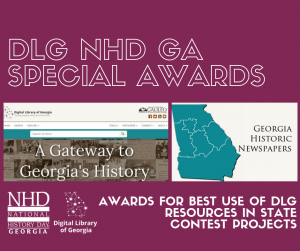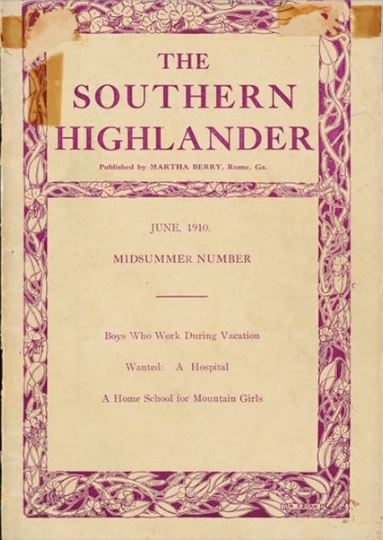
The Digital Library of Georgia has partnered with Georgia Humanities to create a National History Day Georgia resource and state contest special awards designed to engage middle school and high school students in historical research using DLG resources, and recognize the best examples of student work. These include:
- National History Day Georgia Theme Topic Explorer
- Source Recognition Digital Certificates
- Outstanding Use of the Digital Library of Georgia Resources Special Award
National History Day Georgia Theme Topic Explorer
The DLG worked with Georgia Humanities on its National History Day Georgia Theme Topic Explorer. The Topic Explorer provides an interactive list of descriptions and sample resources connected to topics related to National History Day Georgia research themes. Breaking Barriers in History is the 2020 theme for National History Day.
The Topic Explorer includes the theme book for National History Day 2020, theme information, featured resources, a link to the NHD Georgia website, contextual information from the New Georgia Encyclopedia, and links to sample primary sources and introductions related to a group of suggested 2020 theme topics.
The National History Day Georgia Theme Topic Explorer is available at georgiahumanities.org/2019/09/25/nhd-topic-explorer/
Source Recognition Digital Certificates and Outstanding Use of the Digital Library of Georgia Resources Special Award
The DLG will award Source Recognition digital certificates to NHD GA state contest participants who incorporate primary sources found in DLG’s portals in their project. DLG staff will confer the “Outstanding Use of the Digital Library of Georgia Resources” special award on exceptional junior individual, junior group, senior individual, and senior group projects.
The certificates will be distributed via email after the state contest held at LaGrange College on April 18, 2020. More information on applying for the digital certificate and the special awards will be available before the state contest.
About National History Day Georgia
National History Day (NHD) Georgia is a program of Georgia Humanities and LaGrange College. NHD encourages middle and high school students to engage more deeply in the historical process.
Over the course of the school year, students select a topic related to the year’s theme and develop their projects through extensive primary and secondary source research. The NHD theme for 2020 is Breaking Barriers in History.
Under the guidance of a sponsoring teacher, students choose both their subject matter and a vehicle to present their research within the following categories: documentary, exhibition, paper, performance, or website. NHD attracts thousands of participants each year.
Competitions occur at the regional, state, and national levels. The NHD Georgia State Contest host for 2020 is LaGrange College.
About Georgia Humanities
Founded in 1971, Georgia Humanities is an independent, nonprofit affiliate of the National Endowment for the Humanities. We collaborate with others to preserve and promote the rich cultural stories, treasures, and values of our state and its people. Our work nurtures Georgians’ understanding of ourselves and of our state’s place in history and in the world, and it fosters thoughtful and engaged citizenship. Visit Georgia Humanities at georgiahumanities.org.
About the Digital Library of Georgia
Based at the University of Georgia Libraries, the Digital Library of Georgia is a GALILEO initiative that collaborates with Georgia’s libraries, archives, museums and other institutions of education and culture to provide access to key information resources on Georgia history, culture, and life. This primary mission is accomplished through the ongoing development, maintenance, and preservation of digital collections and online digital library resources. DLG also serves as Georgia’s service hub for the Digital Public Library of America and as the home of the Georgia Newspaper Project, the state’s historic newspaper microfilming project. Visit the DLG at dlg.usg.edu.


